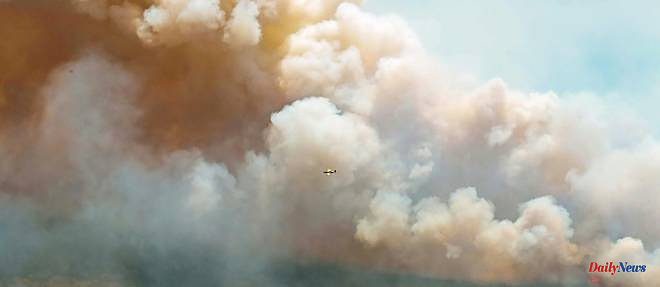The Canadian province of Nova Scotia on Wednesday asked for help from the army and the United States in the face of major forest fires in the east of the country, including one threatening the surroundings of the city of Halifax, resulting in the evacuation of thousands of residents.
“We are going through a crisis in the province and we want, we need and we will accept all the support we can get,” said Tim Houston, premier of this province located on the Atlantic coast, during a press conference. .
“These fires are unprecedented,” he added.
In Ottawa, Prime Minister Justin Trudeau called the situation "heartbreaking" and pledged unwavering support, stressing that help was on the way.
Additional water hoses provided by Ontario, firefighters from US states, a dozen water bombers sent from neighboring regions and the Coast Guard have already joined efforts to extinguish the flames.
"People are tired, frustrated and scared," said Mike Savage, the mayor of the provincial capital, Halifax. More than 16,000 residents of the northwest of the city have already been evacuated.
As of Wednesday, 14 wildfires were active in Nova Scotia, three of which were considered out of control.
Some 200 homes and infrastructure were destroyed, but no injuries were reported.
"It's my life" that went up in smoke, Terri Kottwitz told the public broadcaster CBC in tears, referring to her house and her business which were reduced to dust by the fires.
Janis Churchill-Moher, another evacuee from a village in the south of the province, said she didn't know if her house was still standing.
"Our neighbors have farms and they barely had time to take their children and as many animals as they could before fleeing," she said.
More than 2,000 people were ordered to evacuate the south of the province earlier this week, given the spread of fires.
The dry weather and the temperature records expected in the coming days are also causing authorities to fear that the fight against the fires will last over time.
Smoke from the fires that have been ravaging the province for three days has even reached the Atlantic coast of the United States, causing air pollution peaks in the state of New Jersey and in parts of Pennsylvania.
Nova Scotia's premier announced on Tuesday a ban on all activity in the province's forests, including hiking or fishing.
"Stop throwing cigarette butts out your car window. Just stop. Our resources are incredibly stretched right now to fight the existing fires," he pleaded, pointing out that more than a dozen fires illegal had been reported this week.
These fires come after numerous forest fires devastated the province of Alberta in western Canada in May, ravaging nearly a million hectares and causing the evacuation of tens of thousands of inhabitants.
On Tuesday, 800 residents of Fort Chiepwyan, in the north of the province of Alberta, had to be evacuated by plane as the fires intensified in this isolated hamlet.
According to government statistics, the number of forest fires recorded in Canada has however decreased since the 1980s, undoubtedly due to fire prevention policies.
But recent years have been marked by more intense and more devastating fires.
Western Canada has been particularly affected in recent years by extreme weather events, the intensity and frequency of which are increased by global warming.
06/01/2023 08:32:25 - Montréal (AFP) - © 2023 AFP












